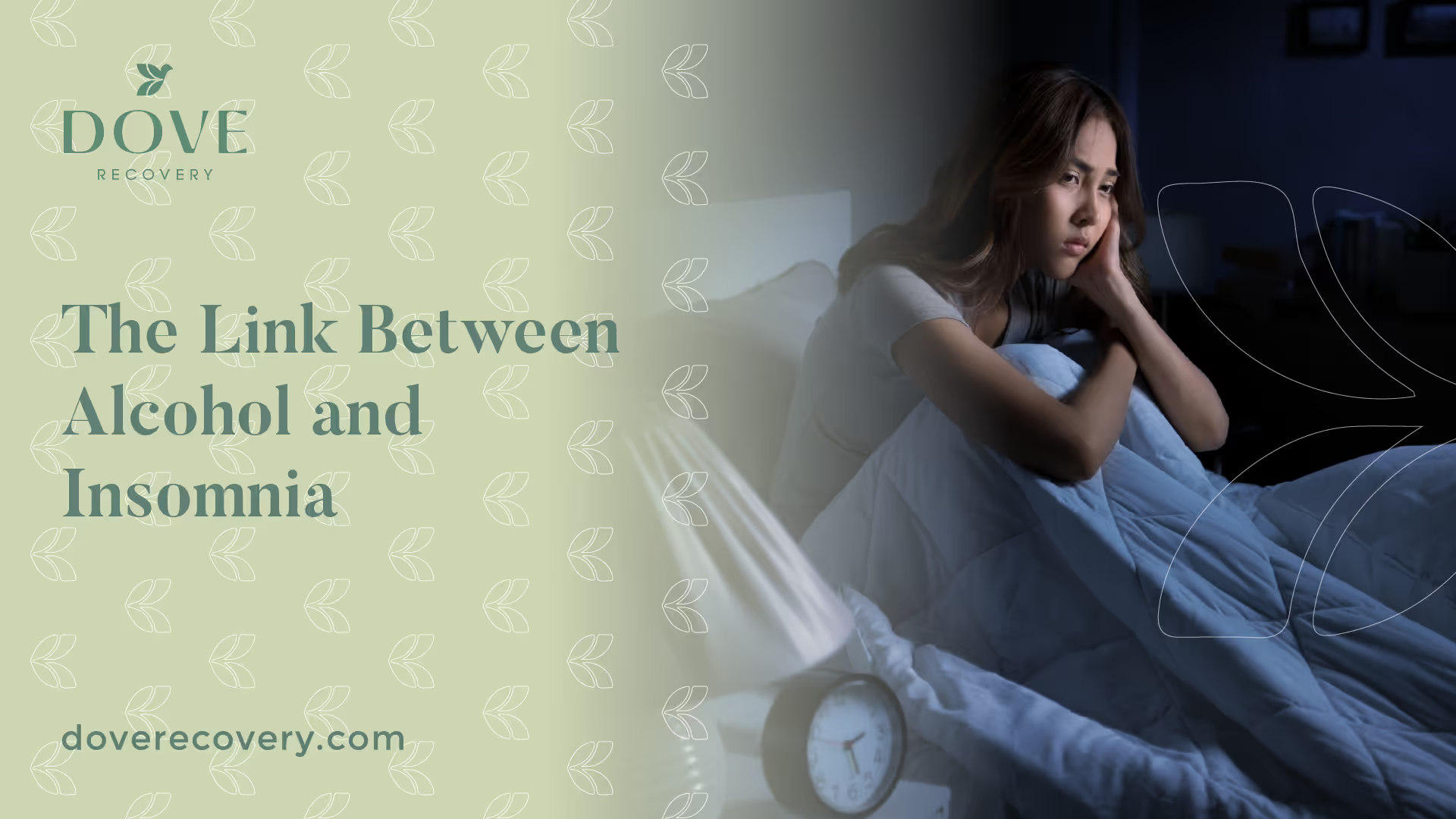The Link Between Alcohol and Insomnia

Understanding Insomnia
Insomnia is a common sleep disorder that affects many individuals worldwide. It is characterized by difficulty falling asleep, staying asleep, or experiencing non-restorative sleep. People with insomnia often wake up feeling tired and unrefreshed, which can significantly impact their daily functioning.

What is Insomnia?
Insomnia is more than just occasional sleepless nights; it is a chronic condition that can persist for weeks, months, or even longer. It can be classified into two main types: acute insomnia and chronic insomnia.
- Acute insomnia is a brief period of sleeplessness that usually lasts for a few nights or weeks. It is often triggered by stressful life events, jet lag, or temporary disruptions to the sleep routine. Acute insomnia typically resolves on its own once the underlying cause is addressed.
- Chronic insomnia, on the other hand, is a long-term sleep disorder that occurs at least three nights a week for three months or more. It is often caused by various factors, including underlying medical conditions, psychological disorders, lifestyle choices, or a combination of these factors. Chronic insomnia requires medical attention to effectively manage and treat the condition.
Causes and Contributing Factors
Insomnia can have multiple causes and contributing factors. Some common causes include:
- Stress and anxiety: A racing mind and excessive worry can make it difficult to relax and fall asleep.
- Medical conditions: Certain medical conditions like chronic pain, respiratory disorders, gastrointestinal problems, and hormonal imbalances can disrupt sleep.
- Psychiatric disorders: Mental health conditions such as depression, anxiety disorders, and post-traumatic stress disorder (PTSD) can contribute to insomnia.
- Substance use: The use of substances like alcohol and caffeine can interfere with sleep patterns and contribute to insomnia. In this article, we will specifically explore the link between alcohol and insomnia.
- Poor sleep habits: Irregular sleep schedules, excessive napping, and an unhealthy sleep environment can contribute to insomnia.
- Environmental factors: Noisy surroundings, uncomfortable room temperature, or excessive light can disrupt sleep.
By understanding the causes and factors contributing to insomnia, individuals can take the necessary steps to manage and improve their sleep quality. In the following sections, we will delve deeper into the relationship between alcohol and insomnia and explore effective strategies for managing this connection.
The Relationship Between Alcohol and Insomnia
Understanding the connection between alcohol and insomnia is crucial to grasp the impact that alcohol consumption can have on sleep patterns. In this section, we will explore the role of alcohol as both a sleep aid and a disruptor of sleep patterns.
Alcohol as a Sleep Aid
Many individuals turn to alcohol as a means to help them fall asleep. Alcohol can initially induce feelings of drowsiness and relaxation, leading some to believe that it improves sleep. However, while alcohol may help you fall asleep faster, its effects on sleep quality and overall sleep architecture are quite different.
Disrupting Sleep Patterns
Despite the initial sedative effects, alcohol can disrupt the natural progression of sleep stages, leading to fragmented and poor-quality sleep. It interferes with the normal sleep cycle by suppressing rapid eye movement (REM) sleep, which is crucial for restorative sleep and dreaming. REM sleep deprivation can result in feelings of grogginess and fatigue upon waking.
Moreover, alcohol can lead to an increase in the number of awakenings during the night. As the body metabolizes alcohol, it can cause shifts in blood sugar levels, triggering wakefulness. This can be particularly problematic for individuals who consume alcohol close to bedtime.
To better understand the impact of alcohol on sleep, it's important to explore alcohol's impact on sleep stages and the effect of alcohol on sleep quality.
The relationship between alcohol and insomnia can become a vicious cycle, as both can exacerbate each other's effects. Alcohol-induced insomnia, which refers to difficulty falling or staying asleep as a result of alcohol consumption, can further disrupt sleep patterns. Conversely, insomnia itself can be a trigger for alcohol use, as individuals may turn to alcohol to self-medicate and cope with sleep difficulties.
Understanding this complex interplay between alcohol and insomnia is essential when addressing sleep issues in individuals who consume alcohol. Moreover, recognizing the bidirectional relationship between alcohol and insomnia highlights the importance of seeking professional help to break the cycle. Professional guidance can provide strategies to address both alcohol use and sleep disturbances.
In the next section, we will discuss valuable tips for managing alcohol-related insomnia, including limiting alcohol consumption, establishing a bedtime routine, and seeking professional help to address the underlying causes and promote healthy sleep habits.
How Alcohol Affects Sleep
Alcohol consumption can have a significant impact on sleep patterns and quality. Understanding how alcohol affects sleep stages and sleep quality is important in recognizing the relationship between alcohol and insomnia.
Alcohol's Impact on Sleep Stages
While alcohol is often mistakenly perceived as a sleep aid, its effects on sleep stages can be quite detrimental. When consumed, alcohol initially acts as a sedative, promoting drowsiness and making it easier to fall asleep. However, as the body metabolizes the alcohol, its effects change.
During the later stages of sleep, alcohol can disrupt the normal sleep cycle. It suppresses rapid eye movement (REM) sleep, which is crucial for cognitive function, memory consolidation, and emotional regulation. REM sleep deprivation can result in daytime drowsiness, difficulty concentrating, and impaired cognitive performance.
Furthermore, alcohol can increase the occurrence of sleep fragmentation, causing frequent awakenings throughout the night. These awakenings disrupt the natural sleep cycle and can lead to a feeling of unrestfulness upon waking.
Alcohol and Sleep Quality
In addition to its impact on sleep stages, alcohol can also negatively affect sleep quality. While alcohol may help individuals fall asleep faster, it ultimately impairs the overall quality of sleep experienced.
Studies have shown that alcohol consumption can lead to a decrease in sleep efficiency. Sleep efficiency refers to the percentage of time spent asleep while in bed. Alcohol disrupts the normal sleep architecture, resulting in a lower sleep efficiency score. This means that even if an individual spends an adequate amount of time in bed, the quality of their sleep is compromised, leading to feelings of fatigue and grogginess upon waking.
To provide a clearer understanding, here is a table summarizing the effects of alcohol on sleep stages and quality:
Effects of Alcohol on Sleep
Suppresses REM sleep
Increases sleep fragmentation
Decreases sleep efficiency
By understanding how alcohol affects sleep stages and quality, individuals can gain insight into the mechanisms behind alcohol-related insomnia.
It's important to note that while alcohol may initially induce drowsiness and help with falling asleep, the subsequent disruptions to sleep stages and quality can lead to a vicious cycle of alcohol and insomnia. In the next section, we will explore this cycle further by examining alcohol-induced insomnia and insomnia as a trigger for alcohol use.
The Vicious Cycle of Alcohol and Insomnia
Alcohol and insomnia often form a challenging and interconnected relationship, creating a vicious cycle that can be difficult to break. Let's explore the two sides of this cycle: alcohol-induced insomnia and insomnia as a trigger for alcohol use.
Alcohol-induced Insomnia
While it might seem counterintuitive, alcohol consumption can actually disrupt sleep and lead to insomnia. Initially, some individuals may turn to alcohol as a sleep aid, as it can induce drowsiness and help them fall asleep faster. However, this effect is short-lived.
As the night progresses, alcohol interferes with the natural sleep patterns and stages. It suppresses REM sleep, the stage characterized by vivid dreams and essential for cognitive function and emotional well-being. This disruption can result in fragmented and disturbed sleep, leading to poor sleep quality and leaving individuals feeling unrested the next day.
Another factor contributing to alcohol-induced insomnia is the effect of alcohol on the body's metabolism. Alcohol is metabolized during sleep, causing an increase in body temperature and potentially leading to night sweats and discomfort. This can further interrupt sleep and contribute to a restless night.
Insomnia as a Trigger for Alcohol Use
On the other side of the cycle, individuals who already struggle with insomnia may turn to alcohol as a means of self-medication or relaxation. They may hope that alcohol will help them fall asleep more easily. However, this can lead to a dangerous pattern.
While alcohol initially induces drowsiness, it ultimately disrupts the natural sleep process, as mentioned before. Individuals who rely on alcohol to fall asleep may find that their insomnia worsens over time. This can create a dependency on alcohol as a sleep aid, perpetuating the cycle of alcohol-induced insomnia.
Moreover, using alcohol to cope with insomnia can have negative consequences on overall health and well-being. It can lead to alcohol dependence and exacerbate existing sleep problems. It's important to break this cycle and seek healthier alternatives for managing insomnia.
Understanding the connection between alcohol and insomnia is crucial for addressing the root causes and finding effective solutions. If you or someone you know is struggling with alcohol-related insomnia, it's recommended to seek professional help. A healthcare provider or sleep specialist can provide guidance and strategies for managing both alcohol use and insomnia.
By breaking the vicious cycle of alcohol and insomnia, individuals can take steps toward better sleep and overall well-being. It's important to prioritize healthy sleep habits, establish a consistent bedtime routine, and consider non-alcohol alternatives for managing insomnia. Remember, seeking professional help is a valuable resource on the journey to improved sleep quality.
Tips for Managing Alcohol-related Insomnia
Dealing with alcohol-related insomnia can be challenging, but there are strategies you can implement to help manage this sleep disturbance. By making certain lifestyle changes and seeking appropriate support, you can improve your sleep quality and overall well-being. Here are some tips to consider:
Limiting Alcohol Consumption
One of the most effective ways to manage alcohol-related insomnia is to limit your alcohol consumption. While alcohol may initially make you feel drowsy and help you fall asleep faster, it can disrupt your sleep later in the night. It's important to be mindful of your alcohol intake, especially close to bedtime.
Reducing your alcohol consumption can have a positive impact on your sleep quality and help establish healthier sleep patterns. If you find it difficult to cut back on your own, don't hesitate to reach out to a professional for guidance.
Establishing a Bedtime Routine
Creating a bedtime routine can be beneficial for individuals struggling with alcohol-related insomnia. A consistent routine signals to your body that it's time to wind down and prepare for sleep. Consider incorporating activities that promote relaxation, such as reading a book, taking a warm bath, or practicing deep breathing exercises.
Additionally, it's important to establish a regular sleep schedule by going to bed and waking up at the same time each day. This helps regulate your body's internal clock and promotes better sleep.
Seeking Professional Help
If you are struggling with alcohol-related insomnia and finding it difficult to manage on your own, seeking professional help is highly recommended. A healthcare professional or sleep specialist can provide personalized guidance and support tailored to your specific needs.
They may suggest therapies such as cognitive-behavioral therapy for insomnia (CBT-I), which can help you develop effective sleep habits and address underlying factors contributing to your insomnia. Additionally, if you are experiencing alcohol withdrawal insomnia, they can provide appropriate guidance and support.
Remember, managing alcohol-related insomnia is a journey that requires patience and perseverance. By implementing these tips and seeking professional help when needed, you can take important steps towards achieving better sleep and overall well-being.
Conclusion
Another factor contributing to alcohol-induced insomnia is the effect of alcohol on the body's metabolism. Alcohol is metabolized during sleep, causing an increase in body temperature and potentially leading to night sweats and discomfort. This can further interrupt sleep and contribute to a restless night.
Sources:
- https://www.ncbi.nlm.nih.gov/pmc/articles/PMC7486899/
- https://www.ncbi.nlm.nih.gov/pmc/articles/PMC2775419/
- https://americanaddictioncenters.org/alcoholism-treatment/insomnia
- https://www.medicalnewstoday.com/articles/alcohol-insomnia#:~:text=Alcohol%20%E2%80%94%20even%20in%20moderate%20amounts,of%20several%20chronic%20health%20conditions.
